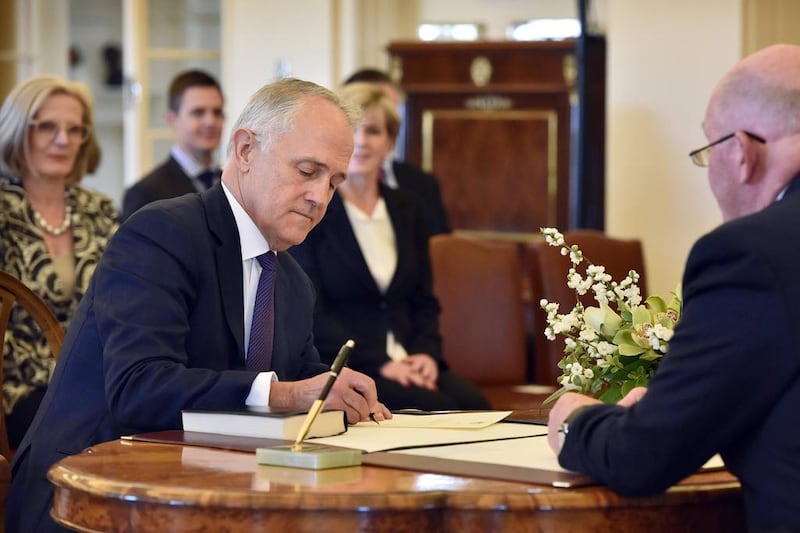MELBOURNE // Yet another Australian prime minister has been ousted in an internal party coup.
Conservative leader Tony Abbott has become the third prime minister in five years to be sacked by the ruling political party.
Long-time rival Malcolm Turnbull was sworn in as Australia's 29th prime minister on Tuesday, after defeating Mr Abbott 54-44 in a Liberal Party leadership ballot a day earlier.
Despite being one of the better performing OECD economies, and ranked second in the UNDP human development index, Australia over the past decade has been dogged by political instability that the global ratings agency Moody’s warned on Tuesday could erode business confidence.
Mr Abbott had been struggling in opinion polls since he won office in 2013, with Mr Turnbull citing the government’s loss of “30 Newspolls in a row” as one of the reasons behind the coup.
According to Mr Turnbull and his supporters, there was no way for Mr Abbott to lead the conservative Liberal Party to victory in the next elections.
“It is clear that the people have made up their mind about Mr Abbott’s leadership,” Mr Turnbull said prior to the party room ballot.
Mr Abbott’s dismissal follows two similar coups in the Labor party when it was in office between 2007 and 2013.
Labor replaced prime minister Kevin Rudd with his deputy Julia Gillard in 2010, only for the party to reverse the move in 2013 prior to the federal elections.
The last Australian prime minister to complete a full term was conservative John Howard, who was defeated by Mr Rudd in 2007.
Commentators have voiced concern at what appears to be a developing pattern of political parties failing to establish stable governments, and denying voters the chance to choose their national leader.
“We’re fed up with this. Have we, the people, become irrelevant? This country has become an embarrassment when it comes to leadership,” Karl Stefanovic, co-host of Channel Nine’s breakfast programme, said on Tuesday.
Lenore Taylor, chief political analyst for the Guardian Australia, wrote that "public respect for the political process is at a perilous low, hovering somewhere just above terminal and very close to contempt".
According to Bernard Keane, political editor of Australian online news outlet Crikey, the major parties have become hollow entities unrelated to the interest of voters.
"Australians are increasingly disengaged with politics, particularly young people. There's a growing informal vote at Australia's compulsory elections, and a growing deliberate refusal to register to vote," he told The National.
Australian politics has also become increasingly sensitive to media coverage and opinion polls.
Mr Abbott blasted the media in his outgoing speech on Tuesday for engaging in “sour, bitter character assassination”.
“Poll-driven panic has produced a revolving-door prime ministership which can’t be good for our country. And a febrile media culture has developed that rewards treachery,” he said.
Mr Keane noted the media’s damaging role in the political landscape, saying it was “focusing much more frequently on personalities rather than on policy.”
Zareh Ghazarian, political scientist at Monash University in Melbourne, blames the recent instability in Australian politics on three dominant individuals: Kevin Rudd, Julia Gillard and Tony Abbott.
“Australia has now removed those three players from the political leadership positions, and we hope from this point that these leadership changes won’t occur with the same regularity,” he said.
Mr Abbott’s policies pushed Australia further to the right, Mr Ghazarian said, which many Australians found uncomfortable.
“The more centred the government, the more success it has in electoral terms,” he said.
Mr Turnbull is known to be a centrist within the Liberal party, and, in contrast to his predecessor, has openly supported gay marriage and more action on climate change.
The instability in government, however, does not necessarily translate to a constrained ability to govern. “While we have changes at political level, the institutions of governance still remain stable and strong because we have an apolitical civil service,” Mr Ghazarian said.
While Australia has not reached the levels of political chaos of democracies such as Italy, where governments survive less than two years on average, the recent coups suggest a new era of political hyperactivity and instability, according to Mr Keane.
“I think that era is going to be characterised by less stability, shorter-lived leaders and possibly a greater turnover not merely of prime ministers, but of governments.”
foreign.desk@thenational.ae





